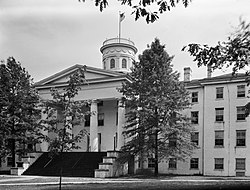Pennsylvania Hall (Gettysburg, Pennsylvania)
|
Pennsylvania Hall, Gettysburg College
|
|

Front of Pennsylvania Hall
|
|
| Location | Gettysburg College campus, Gettysburg, Pennsylvania |
|---|---|
| Coordinates | 39°50′6″N 77°14′5″W / 39.83500°N 77.23472°WCoordinates: 39°50′6″N 77°14′5″W / 39.83500°N 77.23472°W |
| Area | 1 acre (0.40 ha) |
| Built | 1837 |
| Architectural style | Greek Revival |
| NRHP Reference # | 72001087 |
| Added to NRHP | March 16, 1972 |
|
|
|
|
|
Pennsylvania Hall (Penn Hall, Old Dorm) is the Gettysburg College central administrative building and the college's oldest building. Designed in 1835 by John Cresson Trautwine, it was built in 1838 as a "temple-style edifice with four columns in the portico".
During the Battle of Gettysburg in July 1863, Pennsylvania Hall was used as a hospital for wounded troops of the Union and Confederate Armies. The building is also used for the convocation and commencement traditions of entering and departing the college via building.
The 1832 "Pennsylvania College of Gettysburg" (now Gettysburg College) initially shared the Gettysburg Academy building on High Street with the Gettysburg Theological Seminary. The college purchased 6 acres (2.4 ha) from Thaddeus Stevens for $528, and the hall with four stories and 150 by 45 feet (46 m × 14 m) was built with a portico on the south side and a 24 by 17 feet (7.3 m × 5.2 m) .[1] The hall was the only academic building until the 1847 Linnæan Hall was dedicated as a museum of Natural History (later becoming the chemistry lab then the 2nd academic gymnasium).
In the early years of its existence, Pennsylvania Hall contained the students' living quarters, as well as several offices and recitation rooms. At the time of the battle of Gettysburg, the building was the largest building in town. The interior of the hall was renovated in 1869-70.
During the American Civil War, Union signal officers used the Old Dorm cupola on June 30, 1863. On July 1, Michael Jacobs, the chemistry and mathematics professor at the college led Union officers to the cupola to observe the battlefield.
Battle casualties were treated in Pennsylvania Hall through about July 29 [2] and totaled nearly 700—many who died in the building and on surrounding property.
...
Wikipedia


